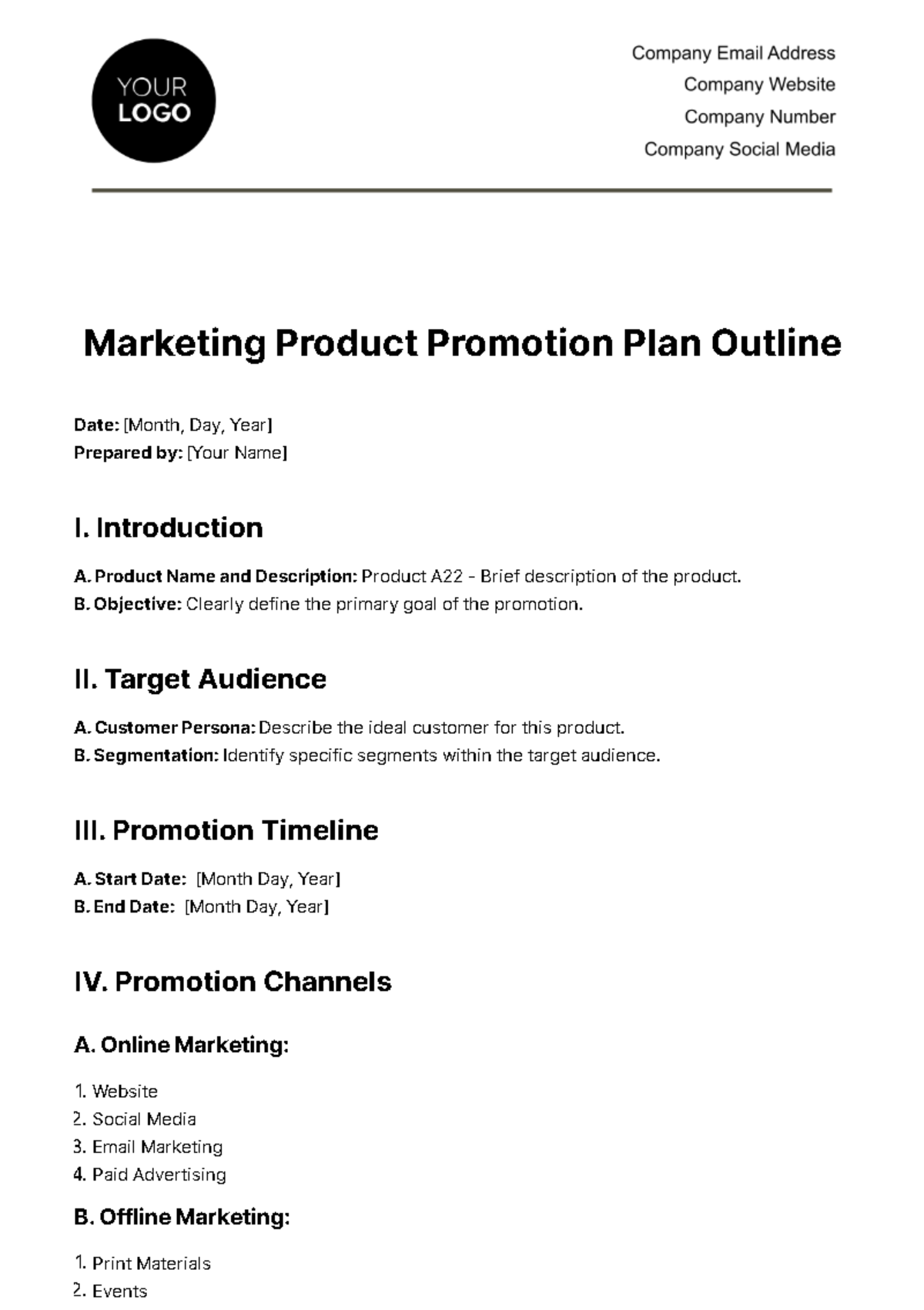Marketing Performance Management Plan
Executive Summary
The Marketing Performance Management Plan outlines strategies, tools, and key performance indicators (KPIs) to measure and optimize our marketing efforts effectively. This plan aims to enhance accountability, transparency, and data-driven decision-making within our marketing department.
Introduction
A. Purpose and Scope of the Marketing Performance Management Plan
The marketing landscape is constantly evolving, shaped by technological advancements, changing consumer behaviors, and global market dynamics. In this era of digital transformation, effective marketing is not just a creative endeavor but a strategic discipline that relies heavily on data, insights, and adaptability. It's with this understanding that we introduce the Marketing Performance Management Plan.
B. The Purpose
The primary purpose of this plan is to provide our marketing team with a structured framework to measure, evaluate, and optimize our marketing efforts comprehensively. It's designed to foster a culture of accountability, transparency, and data-driven decision-making within our marketing department.
C. The Scope
This plan encompasses all aspects of our marketing activities, both online and offline, and applies to every member of our marketing team. From campaigns and content creation to advertising and customer engagement, every facet of our marketing endeavors falls within the purview of this plan.
D. Why Marketing Performance Management Matters
In today's competitive business landscape, the success of our organization hinges on our ability to not only execute marketing campaigns but also to measure their effectiveness, adapt strategies based on real-time insights, and ensure that every marketing dollar is maximized. Here's why marketing performance management matters:
Accountability: Marketing performance management instills a sense of ownership and accountability within the team. By clearly defining roles and responsibilities and establishing measurable KPIs, we ensure that every team member understands their contribution to our collective success.
Data-Driven Decision-Making: The digital age has blessed us with an abundance of data. Embracing marketing performance management means harnessing the power of data to make informed decisions. Data-driven insights allow us to refine our strategies, allocate resources judiciously, and optimize campaigns for better results.
Adaptability: The marketing landscape is dynamic, with consumer preferences and technology constantly evolving. Marketing performance management equips us with the tools and processes to adapt swiftly to changing circumstances, staying ahead of the curve and remaining relevant to our audience.
ROI Maximization: Our marketing budget is a valuable resource. Through marketing performance management, we aim to maximize our return on investment (ROI). This means ensuring that every marketing dollar spent generates tangible results and contributes to our business goals.
Key Performance Indicators (KPIs)
A. Identifying and Defining Relevant KPIs:
To measure marketing performance effectively, we will identify and define KPIs that align with our business goals. These KPIs may include metrics such as:
Metrics | Description |
Conversion Rate | Tracking the percentage of website visitors who take a desired action, such as making a purchase or filling out a contact form. |
Customer Acquisition Cost (CAC) | Determining the cost of acquiring a new customer through marketing efforts. |
Customer Lifetime Value (CLV) | Assessing the long-term value of a customer and their potential revenue. |
Click-Through Rate (CTR) | Measuring the effectiveness of online ads and email campaigns. |
Return on Investment (ROI) | Calculating the return on marketing investments. |
B. KPIs Alignment with Business Goals
Each KPI will be directly tied to specific business goals. For instance, if our goal is to increase revenue by [00]% in the next quarter, our KPIs will focus on metrics related to revenue generation and customer acquisition.
Data Collection and Analytics
A. Data Sources and Integration
We will ensure the integration of data from various sources, including our website, social media platforms, email marketing software, and CRM system. This integration will provide a comprehensive view of our marketing performance.
B. Tools and Platforms for Data Analysis
We will leverage analytics tools such as Google Analytics, marketing automation platforms, and customer relationship management (CRM) software to collect and analyze data. These tools will enable real-time monitoring of performance.
Data Sources | Integration | Tools and Platforms |
Website | Yes | Google Analytics |
Social Media Platforms | Yes | Marketing Automation Platforms |
Email Marketing Software | Yes | Customer Relationship Management (CRM) Software |
Performance Tracking and Reporting
A. Frequency and Format of Reports
Performance reports will be generated on a monthly basis, providing a detailed analysis of KPIs. Reports will include visual representations of data, making it easier for stakeholders to understand trends.
B. Distribution of Reports to Stakeholders
Performance reports will be distributed to relevant stakeholders, including the marketing team, senior management, and key decision-makers. This transparency ensures that everyone is informed about our marketing performance.
Data Interpretation and Insights
A. Analysis of Performance Data
Our data analysis efforts will focus on identifying patterns, anomalies, and areas of improvement. We will track the performance of individual campaigns, channels, and marketing initiatives.
B. Identifying Trends and Opportunities
Through data interpretation, we will identify emerging trends and opportunities for optimization. This may involve shifting resources to capitalize on high-performing channels or adjusting strategies based on changing consumer behavior.
Optimization Strategies
A. Strategies to Improve Underperforming Areas
When KPIs indicate underperformance in specific areas, we will develop and implement strategies to address these issues. This may include refining ad campaigns, enhancing website user experience, or adjusting targeting parameters.
B. Scaling Successful Campaigns
Conversely, we will identify successful campaigns and strategies and work to scale them for maximum impact. This includes allocating additional resources to high-performing channels and replicating successful tactics in other areas.
Budget Allocation and ROI Assessment
Initiative | Budget Allocated | Expected ROI | Actual ROI |
Digital Advertising | $50,000 | 120% | 110% |
Social Media Marketing | $[00,000] | [000]% | [000]% |
Content Marketing | $[00,000] | [000]% | [000]% |
Email Marketing | $[00,000] | [000]% | [000]% |
SEO Optimization | $[00,000] | [000]% | [000]% |
Events and Sponsorships | $[00,000] | [000]% | [000]% |
Total | $[00,000] |
The expected ROI and actual ROI based on the provided budget allocations suggests a mixed performance across marketing initiatives. Digital Advertising, Social Media Marketing, and Email Marketing are expected to deliver high returns, with expected ROI percentages exceeding [000]%. Content Marketing shows promise but may require closer monitoring to meet projections, while SEO Optimization is also poised for a favorable ROI. In contrast, Events and Sponsorships have a lower expected ROI. The total budget allocated is $[000,000] with a total expected ROI estimated at [000]%, indicating an overall positive projection. However, close scrutiny of actual ROI data will be essential to evaluate initiative effectiveness and guide future budget allocation and optimization strategies.
Continuous Improvement
We view marketing performance data as a valuable source of learning. We will use insights gained from data analysis to drive continuous improvement, making adjustments as needed to enhance performance.
We will regularly conduct A/B tests and experiments to optimize various aspects of our marketing campaigns, including ad copy, landing pages, and email subject lines. This iterative approach allows us to fine-tune our strategies over time.
Resource Allocation and Team Responsibilities
A. Assigning Responsibilities for Data Collection and Analysis
Clear responsibilities will be assigned within the marketing team for data collection, analysis, and reporting. Team members will collaborate to ensure data accuracy and consistency.
B. Ensuring Adequate Resources for Data Management
We will allocate the necessary resources, including budget and personnel, to support our data management and analysis efforts. This ensures that we have the tools and expertise needed to effectively execute our performance management plan.
Conclusion
In conclusion, the Marketing Performance Management Plan represents our commitment to excellence in marketing by systematically measuring, analyzing, and optimizing our efforts. By adopting a data-driven approach and aligning our key performance indicators (KPIs) with our overarching business goals, we are positioning ourselves for success in an ever-evolving landscape.
A. Summary of Key Takeaways
Throughout this plan, we've emphasized several key takeaways:
Data-Driven Decision-Making: Our ability to make informed decisions rests on our capacity to collect, analyze, and interpret data effectively. By leveraging the insights gained from our KPIs and performance metrics, we can steer our marketing strategies in the right direction.
Continuous Improvement: Marketing is not a static endeavor; it's an evolving process. We are committed to embracing change and learning from our experiences. Continuous improvement is at the core of our approach, and we will use performance data to guide our evolution.
Resource Allocation: Our allocation of resources will be strategic and data-driven. Budgets will be allocated to initiatives and channels that demonstrate strong ROI, ensuring that our marketing spend is optimized for maximum impact.
Team Collaboration: Our marketing team will work cohesively to ensure that data collection, analysis, and reporting are executed seamlessly. Clear responsibilities and collaboration will be key to our success.
In essence, our Marketing Performance Management Plan is not merely a static document but a dynamic roadmap that will guide our marketing journey. It embodies our commitment to accountability, transparency, and achieving measurable results. By implementing the strategies outlined herein, we are poised to thrive in the ever-competitive marketing landscape and drive our business towards sustainable growth and success.
Thank you for your dedication and collaboration as we embark on this journey to elevate our marketing performance and meet the evolving needs of our audience and industry.






























